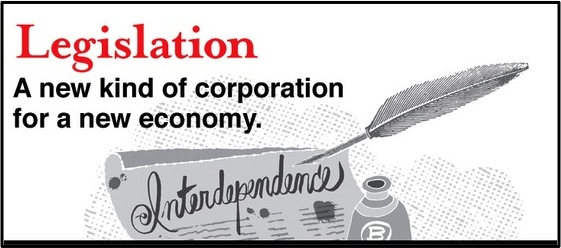Unilever Ups the Ante
"A myopic view of driving shareholder wealth at the expense of everything else will not create a company that's built to last."
- Paul Polman, CEO, Unilever.
CORPORATIONS WITH BENEFITS:
The benefit corporation made its debut in 2007, introducing to the world a never-before-seen business model: a hybrid structure attempting to serve both shareholders and society.A company electing to incorporate as a benefit corporation expands its fiduciary duty to engender positive social and environmental impact and is thus legally obligated to consider not only shareholders, but all stakeholders. The decision makers of a benefit corporation are protected by law when pursuing initiatives that expand beyond the interests of their shareholders. A plethora of renowned corporations are today flaunting their B Corp status: Warby Parker, Patagonia, Seventh Generation, The Honest Company, Ben & Jerry's. The list endures.Yet, the majority (all 1,200+ but two) benefit corporations are privately held companies.This is not coincidental.There is nothing prima facie faulty with benefit corporations, rather it is the corporate structure itself that is susceptible to flaws. On April 17th, 2015, The Sustainable Investor published: Can Wall Street Embrace a Company Attempting to Serve Two Masters?
On April 17th, 2015, The Sustainable Investor published: Can Wall Street Embrace a Company Attempting to Serve Two Masters?
The loss of shareholder voice is an instant destructor of shareholder value. The major impediment to shareholders of a benefit corporation is that the governing documents are overly broad, such that shareholders have granted management a "blank check", consequently relinquishing their control and vote. Analogous to non-voting shareholders, benefit corporation shareholders have ceded decisions to management. Benefit corporations pose two chief concerns: the principal-agency conflict caused by separation of control and ownership, and the obstruction of acquisitions. Both phenomena arise from the potential failure of management to represent the interest of shareholders. The vital question that must be asked for both benefit corporations and companies with two classes of stock is whether the entire firm is destined to underperform. - The Sustainable Investor, 04/2015.
CURRENT STATE OF AFFAIRS:As aforementioned, there are presently two publicly traded benefit corporations: Brazilian cosmetics manufacturer, Natura, and online retailer, Etsy. Ben & Jerry's, New Chapter Vitamins, and Plum Organics are three benefit corporations that operate under the umbrella of publicly traded companies (Unilever, Procter & Gamble, and Campbell Soup Company, respectively).A NEW MILESTONE FOR B CORPS: UNILEVER STEPS UP TO BAT.If Unilever falters, the critics will call for [Polman's] head. - Harvard Business Review.Since Polman took the throne in 2009, Unilever has evolved into one of the world's most innovative corporations, while simultaneously embedding sustainable principles into its DNA.In fact, on Polman's very first day as CEO he announced to his shareholders that Unilever would be abolishing quarterly reporting of profits, eliminating earnings guidance, and altering its compensation structure in order to embrace a long-term focus. He explicitly urged shareholders to invest elsewhere if they did not "buy into this long-term, value-creation model, which is equitable, which is shared, which is sustainable." Bold move for the first day.
We thought about some of the megatrends in the world, like the shift east in terms of population growth and the growing demand for the world's resources. And we said, 'Why don't we develop a business model aimed at contributing to society and the environment instead of taking from them? Businesses that are responsible and actually make contributing to society a part of the business model will be successful. This is not some foo-foo dust. It's hard-wired, and you get what you measure. We think it's directly linked to the bottom line. - Paul Polman, CEO, Unilever.
Behind the scenes, the CEO of Ben & Jerry's, Jostein Solheim, has been spearheading negotiations between B Corp and Unilever."With the Unilever Sustainable Living Plan and Paul's strong leadership within the sustainable business movement we have been interested in assessing how to apply the B Lab assessment to a company of Unilever's scale. Paul is very supportive of B&J's B Corp participation and the way we are leveraging a common standard to grow the overall movement and develop our values-led supplier network." - Jostein Solheim, CEO, Ben & Jerry's.This is no simple task.The benefit corporation process becomes tremendously complex for a company like Unilever, a widely-owned multinational with thousands of profit-hungry shareholders.THE NEXT FRONTIER.The implications are tremendous.Unilever, the third largest consumer products manufacturer in the entire world, with approximately $59 billion in revenue (EOY 2014), wants to alter its by-laws in order to expand its fiduciary duty beyond shareholder value maximization. Somewhere, Milton Friedman is rolling over in his grave.If successful, the consumer goods behemoth would become the world's largest and most distinguished publicly traded benefit corporation, prevailing as a paradigm for other for-profit, mission-driven companies.At this point in time it is difficult to unearth whether Polman is merely flirting with the idea or if he is serious about altering the structure of his company. According to theguardian, Paul Polman told Guardian Sustainable Business that becoming a B Corp would send a powerful signal that the purpose of business is not just profit, but to have a positive impact on society and the environment.Embracing the benefit corporation structure undeniably aligns with Unilever's objectives. Yet, the implementation is anything but straightforward.What metrics will be reported? Is there a threshold of uncertainty such that investors become unwilling to allocate capital? Are we to throw out the dividend discount model, or will Unilever's sustainable initiatives increase the company's excess returns over its cost of capital, such that the net present value of growth opportunities augments appreciably and catapults the stock upward?Most importantly, will the company's shareholders - and Wall Street - allow it?
"If Unilever becomes a B Corp, it would forever raise the bar for global corporations. It would be a powerful blow to the prevailing ethos that creating shareholder value in the form of profits is the only obligation of publicly traded businesses." - Shelly Alpern, Clean Yield Asset Management.
Despite the fundamental structural flaws of a benefit corporation and its risk of trading at a discount to intrinsic value, is it possible an advent of prominent publicly traded B Corps could redefine capitalism?
Featured Photograph by Gary Henderson.


